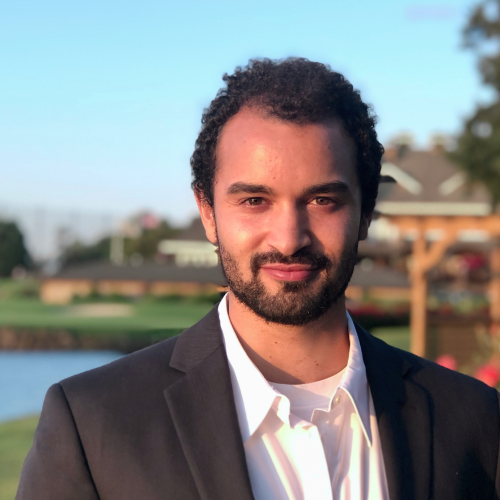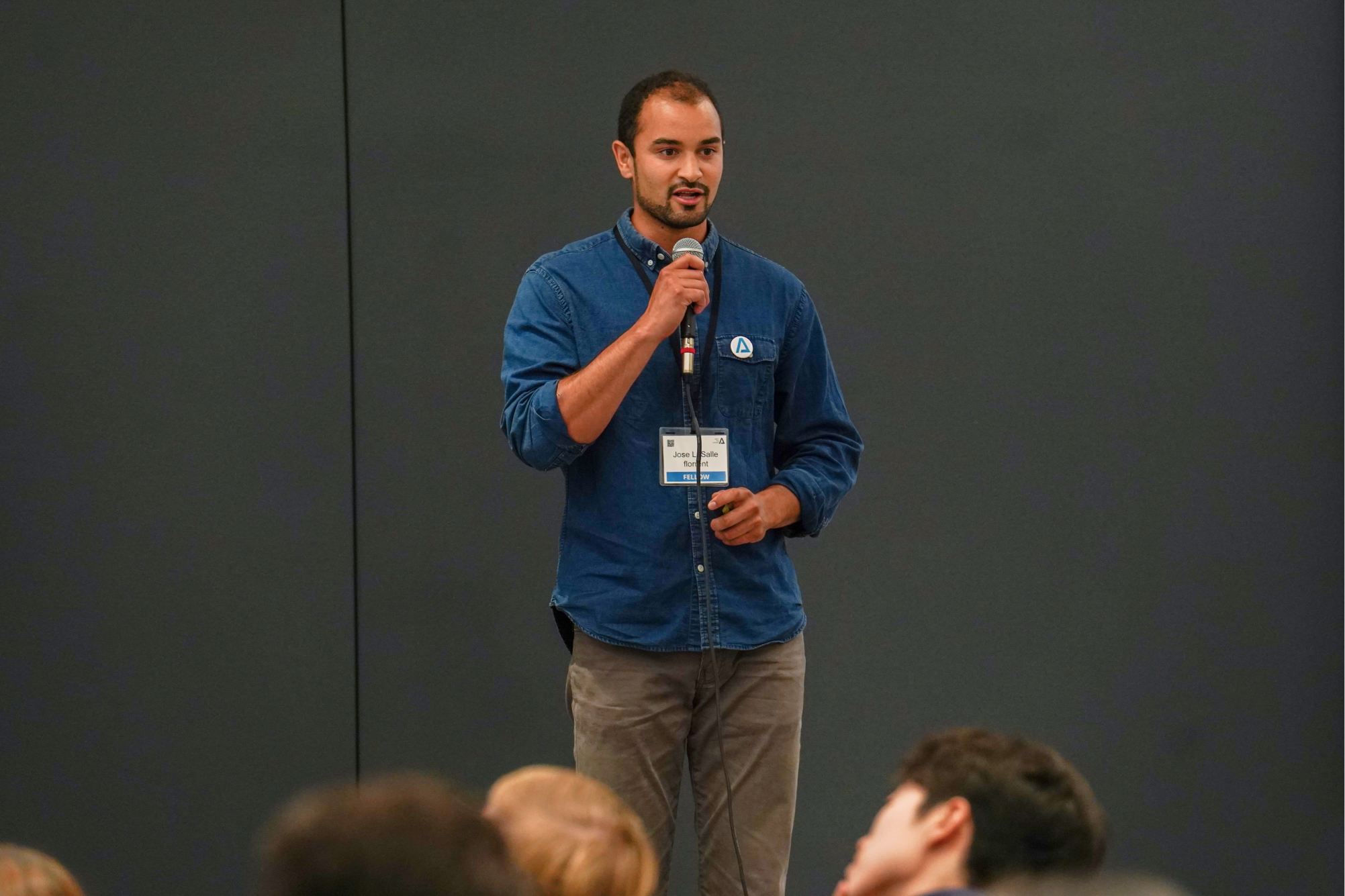Bringing Justice to Climate-Tech Innovation
May 28, 2024
By Jenna Jablonski
The energy transition is gaining momentum as we shift away from fossil fuels and toward low-carbon sources to satisfy global energy demand. Societies are taking action, innovation is accelerating, and we’re moving more quickly than ever toward a future powered by clean energy.
But Dan Recht, Managing Director of the Activate Boston Community, cautions the innovation community to approach this high-pressure moment with responsibility and integrity.
“As things accelerate, the temptation to take shortcuts increases,” he says. “This is the moment where that little devil who sits on your shoulder will say ‘cut a corner’—and the corner you're going to cut is justice.”

Jose LaSalle, co-founder and CEO of florrent
Activate Fellows like Jose LaSalle (Cohort 2023) are not cutting corners. Instead, LaSalle’s advanced materials company, florrent, is developing energy storage devices that he hopes will power the just energy transition—which the International Labour Organization defines as “greening the economy in a way that is as fair and inclusive as possible to everyone concerned, creating decent work opportunities and leaving no one behind.”
“Historically, new technologies have emerged with a double edge by deepening as many divides as they bridge,” says LaSalle.
Indeed, the burdens of energy infrastructure tend to fall disproportionately on marginalized communities. According to the U.S. Environmental Protection Agency, “Minority, low-income, and Indigenous populations frequently bear a disproportionate burden of environmental harms and adverse health outcomes, including the development of heart or lung diseases, such as asthma and bronchitis, increased susceptibility to respiratory and cardiac symptoms, greater numbers of emergency room visits and hospital admissions, and premature deaths.”
According to LaSalle, in addition to reduced environmental harms, a hallmark of a just energy transition would be new economic opportunities that are shared widely, particularly among those who have been historically marginalized or bear the brunt of environmental degradation that we're facing now.
The energy transition requires a wide-scale deployment of green technologies to harness, store, and distribute energy—ideally, renewable energy—to electrify entire sectors of the economy and transform the built environment by retrofitting homes, redesigning our energy grids, transforming transportation infrastructure, says LaSalle.
In this massive effort to move toward a clean-energy future, he says we need to ask, “Who will benefit? Who will bear the costs? And will it reduce or reinforce inequalities?”
“Historically, new technologies have emerged with a double edge by deepening as many divides as they bridge. ”
LaSalle’s unique journey as a science entrepreneur
Can climate-tech companies play a role in the just energy transition? LaSalle thinks so, and he’s trying to prove it through his work with florrent. “Our company’s thesis is that we can build a profitable business that's economically sustainable, is built upon an innovative technology, and contributes to the well-being of people and the planet.”
How did LaSalle’s journey in energy and justice begin?
LaSalle points to his upbringing: having scientists, engineers, and farmers in his family; being oriented toward the natural world, thanks to his Afro-Indigenous roots; and having a diverse family representing various continents, and his resultant desire to “live a life that uplifts people who have been historically underrepresented and marginalized.”
LaSalle also experienced moments of energy scarcity in his youth, a challenge that drove his desire to find energy solutions.
LaSalle’s experience is not unique. Low-income households shoulder a disproportionately high energy burden—or the percentage of their income spent on household energy costs. The U.S. Department of Energy (DOE) reports that the energy burden for low-income households (six percent) is three times higher than that of non-low-income households (two percent), with energy burdens as high as 30 percent for some.
According to the DOE, “High energy burdens can threaten a household’s ability to pay for energy, and force tough choices between paying energy bills and buying food, medicine, or other essentials.”
“In this massive effort to move toward a clean-energy future, LaSalle says we need to ask, ‘Who will benefit? Who will bear the costs? And will it reduce or reinforce inequalities?’ ”
With a background in electrical engineering and research experience focused on materials synthesis for energy storage devices, and after working at a couple of startups, LaSalle decided to pursue his own path as a science entrepreneur.
“I started by talking to my friends in Tribal communities,” LaSalle explains, “Meeting with them, sitting in ceremony, and learning about their challenges and visions related to power and agriculture.” At the same time, LaSalle and his co-founders identified power quality and reliability as a pain point in the energy transition, driven primarily by the adoption of intermittent renewables, electrification, an aging infrastructure, and an increase in volatile weather events. These power problems can take the form of momentary outages lasting for 10-30 seconds, which can cost businesses millions of dollars in losses.
This is how LaSalle noticed an opportunity—to source biomass waste from BIPOC farmers and other agricultural communities as a feedstock for energy storage products to alleviate power quality problems for businesses that can’t afford even a few seconds of power loss.

LaSalle and his co-founders went on to build their company, florrent, to create electrical storage devices called supercapacitors, “that act like electrical shock absorbers, which are promising replacements for lead acid batteries as momentary backup power for commercial and industrial businesses,” explains LaSalle. florrent’s supercapacitors also have applications for grid-level power quality and reliability. florrent partners primarily with BIPOC farmers to obtain crop waste originally heading to landfills, which florrent brings through their proprietary activation method to create activated carbon, a key component of florrent’s high-performance supercapacitors.
Currently at the seed stage, florrent works with 13 Indigenous Tribes in the Pacific Northwest as a sub-awardee on a $10M U.S. Department of Agriculture grant aimed at strengthening the bio-manufacturing economy.
Down the road, LaSalle envisions enabling a “constellation of energy-sovereign communities that generate, store, and use renewable power locally—with a particular focus on those who tend to lose their power first and get it turned back on last,” LaSalle says.
His ultimate aim is to benefit people and the planet by “sequestering carbon from the production of biomass, and sequestering wealth in communities as well.”
LaSalle has built justice into his company in many other ways, too. For example, he is focused on building a diverse team. florrent also prioritizes engagement with the local community in Boston, where the company is based, from being active in incubators to hosting students from nearby schools and universities to learn about florrent’s technology and mission.
A “big moment” for the just energy transition
More than ever, the just energy transition is translating into government initiatives: from Massachusetts’ first-ever environmental justice strategy, to the Biden Administration’s Justice40 commitment, promising “40 percent of the overall benefits of certain federal climate, clean energy, affordable and sustainable housing, and other investments flow to disadvantaged communities that are marginalized by underinvestment and overburdened by pollution.”
Likewise, national climate legislation has placed a new focus on the just energy transition. For example, the Inflation Reduction Act includes “historic investments in environmental justice,” and the Bipartisan Infrastructure Law delivers the “largest investment in tackling legacy pollution in American history.”
In terms of private capital and climate financing, more and more investors are embedding just transition principles into their investment criteria. LaSalle recommends looking to Clean Energy Ventures and MassVentures as examples, which he describes as “beacons” in this area.
The just energy transition has also been at the forefront of international climate dialogue, including at COP28, where the theme of the sixth day of the conference was a “just transition.”
Why is all this happening now? LaSalle posits that it’s a mix of greater public awareness of injustices, leaders who care, and technological advancements that are finally enabling a transition to clean energy.
“This is a big moment, and it's definitely given me a lot of hope,” LaSalle says. “My outlook is that we have the potential to create massive economic opportunities and benefit individuals and communities across the world, starting with very local initiatives.”
“Our company’s thesis is that we can build a profitable business that’s economically sustainable, is built upon an innovative technology, and contributes to the well-being of people and the planet. ”
The importance of diverse innovators
Recht, who advises LaSalle and other fellows in the Activate Boston Community, says that LaSalle stands out for his thoughtfulness and his orientation toward justice.
These traits might make LaSalle an outlier in the financially motivated tech community, Recht says—but not as much among Activate Fellows, who are generally community-minded and driven by “intense personal conviction towards positive change for the world.”

LaSalle is known for bringing communities together, including organizing a trip to the climbing gym for fellows in the Activate Boston Community.
To Recht, LaSalle is a testament to the Activate model: “Activate is not a prescriptive organization; we act on the world through our fellows and how we support them,” Recht says. “So if we are able to build a diverse community of fellows and coach them effectively, they will bring justice as they bring their technologies.”
“If we are able to build a diverse community of fellows and coach them effectively, they will bring justice as they bring their technologies. ”
LaSalle is an example of why we need diverse innovators at the table as we create a clean-energy future. According to LaSalle, “A diversity of experiences is integral to commercializing energy technologies that have scaled and enduring impact.”
As LaSalle acts on his vision for a just energy transition, he has found that more and more people are thinking like him. He says what keeps him going is “realizing that we're not in this alone, we are continuing the work of generations of people before us, and we’re part of a chorus of others with a shared vision for what the future can be. We have an opportunity to do this together.”
